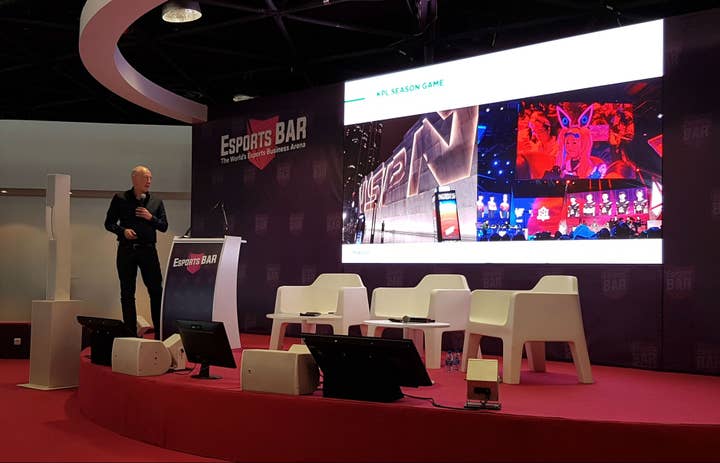"China is saying is that esports is cool, and more healthy than gaming itself"
What role can "offline" esports events like summer camps play in repairing the industry's relationship with the Chinese government?
Esports could be the key to solving the games industry's uneasy relationship with the Chinese government. According to speakers at Esports Bar Cannes last week, the emergence of "offline" activities like dedicated summer camps are helping to bring games into line with values the national government is seeking to promote.
The concept of "esports summer camps" was mentioned by numerous speakers as a rising trend for the coming years, but it was addressed most directly by Peter Warman, the co-founder of the data company Newzoo, a specialist in esports.
Warman said he had been to one such camp in Chengdu recently. "More of a winter camp," he acknowledged. "But they had bigger screens than the Esports Bar over there."
"You can learn a lot from China," Warman continued. "We all know about the crackdown on games; that they stopped adding new games, that they're trying to limit the time that people spend on competitive gaming. This has taken a third of the game revenues of China's big game companies last year. That's really big."
"It's all about summer camps. The Chinese government simply wants the kids to go outside more"
Peter Warman
This is a reference to an eight-month freeze on new game licenses in China last year. That followed Tencent limiting the amount of time young people could spend playing its games each day, under pressure from the Chinese government over fears around addiction to online games.
The uncertainty that the Chinese government's stance on video games created had a huge impact on the share value of Tencent and NetEase, which has also started limiting the amount of time young people can spend playing its games.
The situation has abated to a degree, but China's apparent issues with online games have not been solved. Companies like Tencent and NetEase now have a vested interest in bringing their own goals in line with those of the government.
"But it's all about summer camps," Warman added. "The Chinese government simply wants the kids to go outside more. And in China [the government] can influence the business. They can help with that.
"I was not surprised when, a couple of weeks after the ban was lifted and everything started rolling, that China officially said that esports athletes is a real profession. What China is saying is that esports is cool, and more healthy than gaming itself."
China recognised two roles associated with esports as official professions earlier this month: esports operator, and esports professional. This recognition for those who organise, promote and compete in esports in China is an essential step in building a stable and legitimate market in the region. According to Warman, that is being backed by huge investment in esports in cities across the country.
"There's enormous stimulus going out to the esports ecosystem in China," he said. "That goes so far that I think there are nine cities now that are claiming to be the capital of esports in China -- putting in up to $1 billion a city, to create whole parts of the city as an esports hub."
"I've had people pitching esports summer camps probably since the inception of ESL"
Ralf Reichert
The most prominent of these is Guangzhou, which Warman estimates has 1,000 internet cafes that have rebranded to become destinations for offline esports. And the "offline" aspect is vitally important, because the government's concerns around games have strong ties to concerns around the amount of time young people spend online.
"Bringing in the offline experience is something that is exploding," Warman said. "Investments in the West by Chinese [companies] will intensify [in 2019], but they will be in esports communities and things around that.
"Because that is their objective. Online to offline. Summer camps."
These conditions mean that esports summer camps are more likely to proliferate in China than elsewhere right now, but Ralf Reichert, CEO of the esports production firm ESL, said that the idea has been "haunting my life" for many years.
"I have had people pitching esports summer camps probably since the inception of ESL," Reichert said in an earlier session at Esports Bar Cannes. "We tried them back in the day -- it was a terrible idea, and the wrong timing."
ESL was founded as "Electronic Sports League" in 2000, well before the resurgence of esports over the last five to ten years. However, now that the market is growing and maturing, Reichert believes summer camps for kids could flourish wherever esports is popular.
"I think it's the right time," he said. "It will come."
Esports Bar Cannes is operated by Reed Exhibitions, the parent company of GamesIndustry.biz publisher Gamer Network.

